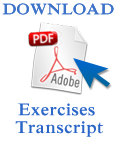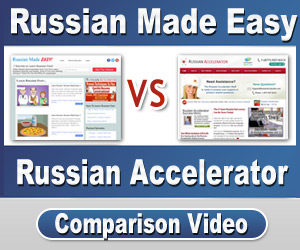Family and Occupations in Russian
**New MEDIA CENTER – located here**
NOTE* – Episode downloads and extras are located at the bottom of this page.
Listen To Entire Episode
Exercises Only
If you can’t read Russian yet, lets get that out of the way. You can do it in just a few hours. Go here –> Learn to Read Russian Free Video Course
Hello, this is Mark. Welcome to Russian Made Easy. If you have any doubts about your ability to learn Russian, you can set them aside right now. The fact is, your success in the language has nothing to do with whether you’re good at languages or not. It all comes down to the method you use.
In these podcasts we’ll be using modern language learning techniques like contextual learning and pattern recognition to help you learn Russian in no time. All you need to do is just follow along…and be sure to speak out loud when prompted.
Alright, let’s jump right in. I’d like you to listen to the following three Russian words and try to guess what they could possibly mean. Even if you have no experience at all, I bet you’ll get them. Ready?
доктор, инженер, бизнесмен
NOTE: I’ve chosen to not sound out the Russian words in this transcript using English letters. Instead, I suggest quickly learning to read Russian so you can follow along. Here’s my free course: Three Hour Cyrillic which will teach you to read Russian in just a few hours.
I’m going to have our native speaker say them again, and I’d like you to repeat, out loud, after he says each one. The thing is, learning a language requires participation. If you just passively listen to these podcasts, you won’t benefit much. So, throughout all these podcasts, I’ll be asking you to say things — out loud — in Russian all the time. So, please repeat after the native speaker:
доктор, инженер, бизнесмен
You probably found it easy to understand the meaning of those Russian words. That’s because they’re cognates, that is, words that sound very similar between two languages and have the same meaning.
Repeat them one more time after our native speaker. That rolled “r” will be tricky for you at first, but we’ll perfect it a bit later. So, just try your best for now.
доктор, инженер, бизнесмен
So, in English we say doctor, and in Russian it’s: доктор
We say “engineer” but in Russian they pronounce it: инженер
And we say businessman, but in Russian it’s…бизнесмен
Now it’s your turn. I want you to fill in the Russian occupation at the end of each sentence. And please say it out loud.
Someone who practices medicine is a….доктор,
Someone who provides solutions to technical problems is an…инженер
Someone who owns a business is a…бизнесмен
Again, those are cognates. And the good news is that there are hundreds of cognates between Russian and English. In essence, it means you come into the language already knowing hundreds of useful words. We just need to “russify” our pronunciation a bit.
Alright, now let’s look at a purely Russian word. Repeat after the speaker:
Я
One more time:
Я
What does it mean? Well, the best way to learn the meaning is to let your brain figure it out on its own, by how it’s used in a sentence. This is what we call “Learning from context.” Let’s give it a try.
My Dad happens to be a doctor. So, if a Russian person asked my dad what he does, he’d answer with two words:
Я – доктор.
My brother, meanwhile, is an engineer. So, if a Russian person asked my brother what he does, he’d answer with these two words:
Я – инженер.
So Я translates as….I
Try saying, all in Russian: I am a doctor.
Я – доктор.
Now say: I am an engineer.
Я – инженер.
Notice how Russian doesn’t add any verb here. They literally say just:
I – engineer.
This brings up an important point. Students write to me all the time asking,
“So…In Russian they just say I engineer?? Aren’t they missing the word am?”
Here’s the thing: Languages are NOT translations of each other. They are each a unique way of using sound to convey information about the world. So, if you’re trying to tell a Russian speaker, “I ….am ….a ….. doctor” you don’t want to grab a dictionary and say “OK, now what’s the Russian word for “I”. And the Russian word for “am”? And so on. What you want to know is how they convey the idea that “I’m a doctor.”
So, do not expect Russian to have a word for everything that English has a word for. But you can expect it to have some way of expressing the same things that we need to express in English.
With that in mind, please say the following in Russian: I’m a businessman.
Я – бизнесмен.
So far so good? Great! Then let’s try two more purely Russian words. Repeat after the native speaker:
он, она
One more time:
он, она
Instead of me just telling you what ОН and ОНА mean, it’s much more effective to let you figure out the meanings on your own, by how they’re used. Again, this is what’s known as learning from context. So…
We remember that my father is a doctor, right?
So, if someone asks me what my dad does, I’d say:
Он – доктор.
And if someone asks me what my brother does, I’d say:
Он – инженер.
Do you have a feel for what it means? “Он” is one of the Russian words for “he”.
Try saying: He is a businessman.
Он – бизнесмен.
Now, any guess what OHA means?
Well, imagine my sister is a doctor, and a Russian person asks me what she does. I’d tell them:
Она – доктор.
So, OHA is one of the Russian words meaning “she.” So how would you say:
She is an engineer.
Она – инженер.
If you’re getting all these, you’re off to a great start!
V.O. And now, here’s your Tip of the Day from Russian Made Easy…
This is roughly the halfway point of this podcast and I’d like to share some thoughts about memory. In a nutshell, when learning a new language, here’s the trick to developing your long term memory:
You start by learning anywhere from three to seven new words. You need to learn them from context, and then use them in a sentence or two. So you learn it, then use it. And then, here’s the key: You think about something else.
Look out the window, for example, and describe what you see. Or go to ESPN’s website and read about last night’s game. Do something requiring all your attention. That, of course, is what I’m making you do at this very moment. The big variable is how long you’re able to concentrate on this other task and
still retain the new information you learned. But even a minute or two will suffice. Down the road, once you’ve developed your Russian vocabulary, you can do this kind of diversional thinking in Russian instead of English.
Then the final step — after that brief time out — is to try to recall as much as you can of what you just learned. If you’re able to, try writing everything out. Otherwise, just say things out loud.
So take a moment and ask yourself what were the new words and phrases we learned so far in this podcast. I’ll wait, while you find the PAUSE button.
Alright…so, how’d you do? By my count, we learned six new words, so check your list. You should have “Doctor, engineer, and businessman”
доктор, инженер, бизнесмен
and “I, he, she”
Я он она
If you remembered most or all of them, you’re doing great. So here’s your mid-podcast exam: Please say the following in Russian:
I’m a businessman, he’s an engineer, she’s a doctor.
Я – бизнесмен. Он – инженер. Она – доктор.
Ready for more? Let’s learn three more easy cognates dealing with professions. As always, repeat after the native speaker:
музыкант, студент, студентка
Try to say them again, this time before our speaker. Go!
музыкант, студент, студентка
Good job! Now here they are in context:
Anyone who plays a musical instrument can be considered a музыкант
My favorite музыкант is Paul McCartney.
So, tell me. What’s the Russian word for musician?
музыкант
What about the meaning of студент and студентка? Well…
If you go to school, and you’re a male, you’re a студент,
If you go to school, and you’re a female, you’re a студентка
So we see that Russian has a male and female version of the word “student”
студент for guys,
студентка for girls.
Now that we’ve learned them by seeing them in context, let’s use them in a sentence. Tell someone that you’re a musician:
Я – музыкант
Say: She is a student.
Она – студентка
How about: Sergei is a student.
Сергей – студент
By the way, just with the tone of our voice, we can create questions with these words. For example, what do you think this person is asking?
Он – студент?
Is he a student?
How would you ask: Is Katya a student?
Катя – студентка?
Is Nikolai a musician?
Николай – музыкант?
We’ve actually covered a lot of material in this podcast, and I’m tempted to stop here to let it sink in. But there are two more reaaaaallly easy cognates I’d like to toss in. So, take a wild guess which family members these are. Ready?
Мама
Папа
I’m sure that really stumped you guys. So, tell someone:
Dad is a doctor.
Папа – доктор.
Mom is a musician.
Мама – музыкант.
I’m a student. (if you’re a guy)
Я – студент.
How would a girl say that?
Я – студентка.
Dad is a businessman.
Папа – бизнесмен.
Mom is an engineer.
Мама – инженер.
How’d you do with these? If you got most or all of these, then you’re off to a great stat already in Russian. Next time we’ll talk about the biggest mistake that virtually all language students make.
By the way, I’ve made a much shorter, practice version of this podcast. It has just the exercises, without the explanations. Grab a copy of those plus a full transcript of this podcast below. I’ll see you in the next episode.
DOWNLOADS – (right click with mouse and “save as”)


Please comment or share with one of the buttons below. Your support helps keep the ball rolling!





Leave a Reply